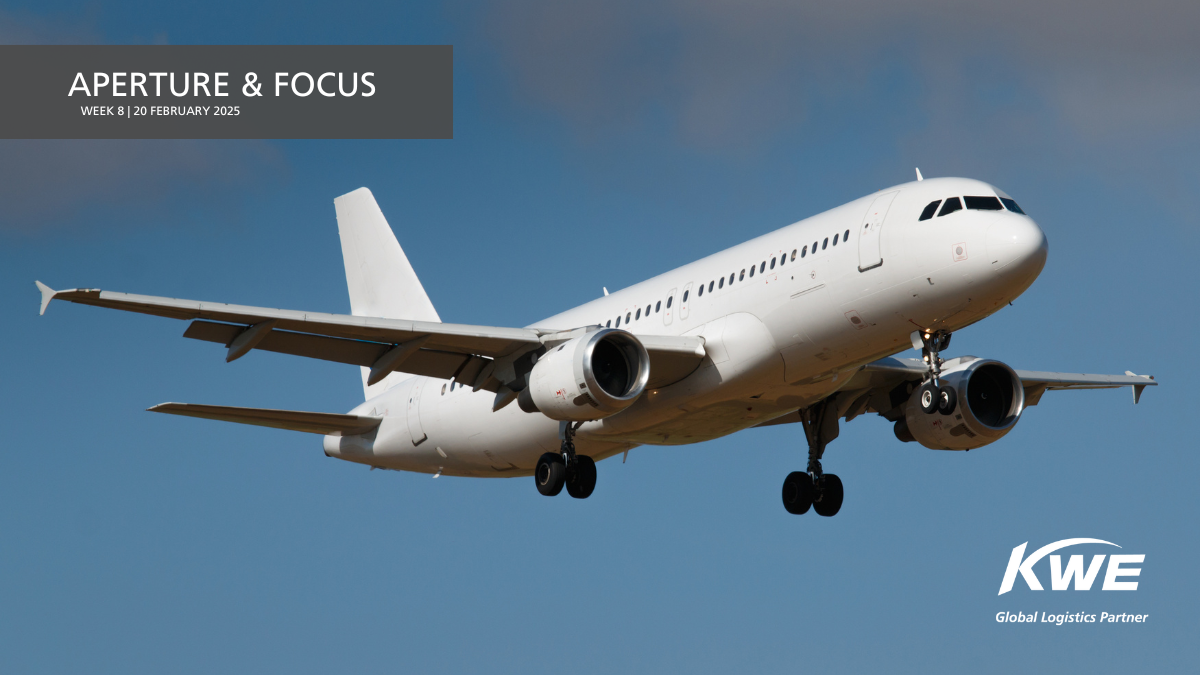Quote
Aperture & Focus 2025: Week 8

Global Aperture
Supply chains are shifting as companies increasingly move production and sourcing out of China, according to a recent survey of logistics professionals, with North America and Sub-Saharan Africa emerging as key beneficiaries of this trend. While factors like tariffs, rising labor costs, and regulatory changes drive diversification, China’s infrastructure and efficiency mean many companies will retain some operations there while expanding elsewhere for resilience.
In the weeks following Lunar New Year, transpacific freighter flights between Asia and the U.S. remained down by 13%, equating to 12 fewer daily flights. This reduction may be influenced by recent U.S. tariffs on China and the brief suspension of the de minimis exemption, which allows shipments under $800 to enter the U.S. duty-free, though the overlap with seasonal factors like Chinese New Year and Valentine's Day complicates precise attribution.
The transition to new shipping alliances on the Asia-North Europe trade will reduce scheduled liner capacity by about 11%, despite an increase in weekly sailings from 26 to 28. Meanwhile, the Asia-Mediterranean trade will see a slight capacity increase of 5%, with changes driven by shifts in alliances and the potential resumption of Suez Canal transits later in 2025.
Regional Focus
Americas
United States: The de minimis exemption, which allowed e-commerce imports valued under $800 to enter the U.S. duty-free, was suspended for goods coming from China on February 1st, 2025. This suspension created a backlog of over a million parcels at JFK Airport and added logistical challenges for customs agencies and businesses. However, the suspension was lifted on February 7, 2025, easing some of the pressure but still leaving e-commerce shipping strategies to adjust to the new duties and complexities.
On February 14th, the White House initiated a plan that aims to impose "reciprocal tariffs" on countries that maintain higher tariffs and non-tariff barriers against U.S. exports. This strategy aims to address trade imbalances by aligning U.S. tariffs with those of its trading partners. The European Commission has criticized this move, describing it as "a step in the wrong direction" and warning that such tariffs could increase costs for businesses and consumers.
Asia-Pacific
Major airport expansions across the Asia-Pacific region, including projects in China, Australia, and Cambodia, are set to boost airfreight capacity and support growing trade demands. New infrastructure developments, such as Western Sydney International Airport and Dalian Jinzhou wan International Airport, aim to accommodate growing trade demands and strengthen the region’s role in global supply chains.
India: Vizhinjam Port, located near Thiruvananthapuram in Kerala and strategically positioned on a major international shipping route, has rapidly emerged as a key maritime hub, handling 170 ships and 370,000 twenty-foot equivalent units (TEUs) in just five months. The port’s inclusion in MSC’s "Jade" service—a shipping route connecting Asia to Europe—further underscores its growing importance in global trade by enhancing its connectivity and operational efficiency.
China: A new container service connecting China’s Beibu Gulf with Vietnam and India aims to boost trade between the growing regions. The service will handle exports from China and imports from Vietnam and India, supporting economic ties and regional initiatives like China's Belt and Road and Vietnam’s Two Corridors, One Belt project.
Europe, Middle East & Africa
Netherlands: The Port of Rotterdam is facing further disruption due to an ongoing labor dispute at Hutchison Ports’ Delta II Terminal, where unplanned strikes and slowdowns have already caused vessel omissions and delays of up to 48 hours. With unions threatening continued action over port automation concerns, congestion has worsened, leading to extended wait times for inland barges and feeder vessels, with some operators reporting delays of up to 76 hours.
Schiphol Airport is facing backlash over its proposed tariff increases, which would see cargo flights hit with a 41% increase starting April 1st. Air Cargo Netherlands argues the changes unfairly burden cargo operations, potentially reducing cargo flights by 25% and harming Schiphol’s role as an air cargo hub.
Belgium: On February 13, nationwide strikes in response to government pension reform plans led to the closure of Belgian airspace from 6:45 a.m. to 10:15 p.m., resulting in the cancellation of most flights at major airports, including Liege and Brussels. While operations have since resumed, the disruption significantly impacted cargo operations, with Liege Airport—a key European freight hub—suspending the majority of its services during the strike period.